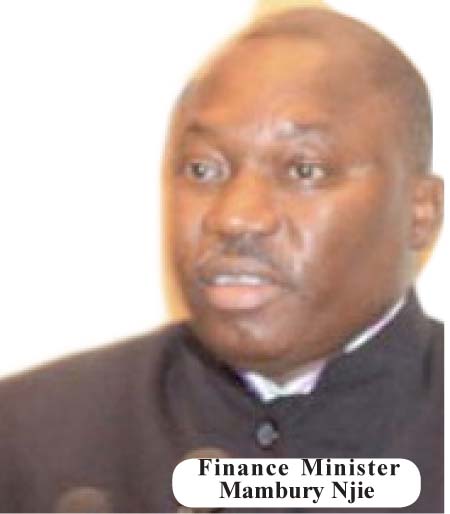
Finance
Minister Mambury Njie has stated that the total revenue and grants in 2020 is
projected at D24.47 billion, representing a reduction of 3% over 2019 figure of
D25.2 billion. The reduction is mainly attributed to project grants and budget
support, he told legislators on Monday as he tabled the 2020 budget
expenditure.
He
said project grants are estimated to decrease from D9.9 billion in 2019 to D8.1
billion in 2020, whilst “we are also factoring budget support to the tune of
D2.7 billion in 2020 compared to D3.4 billion in 2019. This is expected to come
from our development partners, mainly the European Union and the World Bank.”
Mr.
Njie explained that total expenditure and net-lending is projected to increase
from D28.825 billion in 2019 to D30.048 billion in 2020, representing an
increase of 4 percent. He added that the bulk of the increment is attributed to
debt interest payments. Personnel emolument expenditure are projected to
increase from D4.2 billion in 2019 to D4.49 billion in 2020, mainly as a result
of yearly promotions additional teachers and health workers that will be
recruited, the minister said.
According
to him, Debt interest payment is projected to consume around 40 percent of government’s
tax revenues in 2020 compared to 26 percent in 2019, moving from D2.702 billion
in 2019 to D4.648 billion in 2020, explain that the increment was as a result
of mounting debt stock, domestic debt in particular, coupled with the envisaged
rolling over of some of the domestic debt.
Mr.
Njie said that other current (Non-Interest) expenditure is estimated to decline
from D20.064 billion in 2019 to D18.206 billion in 2020, “reflecting our
intention to embark on a fiscal consolidation process, capital expenditure is
estimated to increase from D1.880 billion in 2019 to D2.752 billion in 2020,
mainly as a result of the various new and ongoing projects in particular the
OIC and Banjul rehabilitation projects.”
Minister
Njie further explained that in terms of financing the deficit, Domestic
Borrowing is projected to increase to D3.9 billion in 2020, which represents 4
percent of GDP, compared to D1.236 billion in 2020, staying within this
borrowing ceiling and working towards reducing it is premised mainly on strict
adherence to budget ceiling by all budget entities as well as the
implementation of structural reforms.
“In
addition the government is also expecting to conclude negotiation on debt
restructuring with development partners, and an estimated D2 billion could be
potentially freed up to 2020 as a result of this debt deferral this will give
the necessary fiscal space to address debt sustainability issues as well as
more financing of the national budget to priority National Development Plan
(NDP) spending.”
He
said this budget will be a useful tool in drive to achieve and sustain
macroeconomic stability and the government’s primary objective of reducing
poverty and improving basic service delivery for all, if we all recommit to
strict fiscal discipline.
“The
budget in essence is the single most important mechanism used by government to
direct the social, economic life of the people of our nation.”



